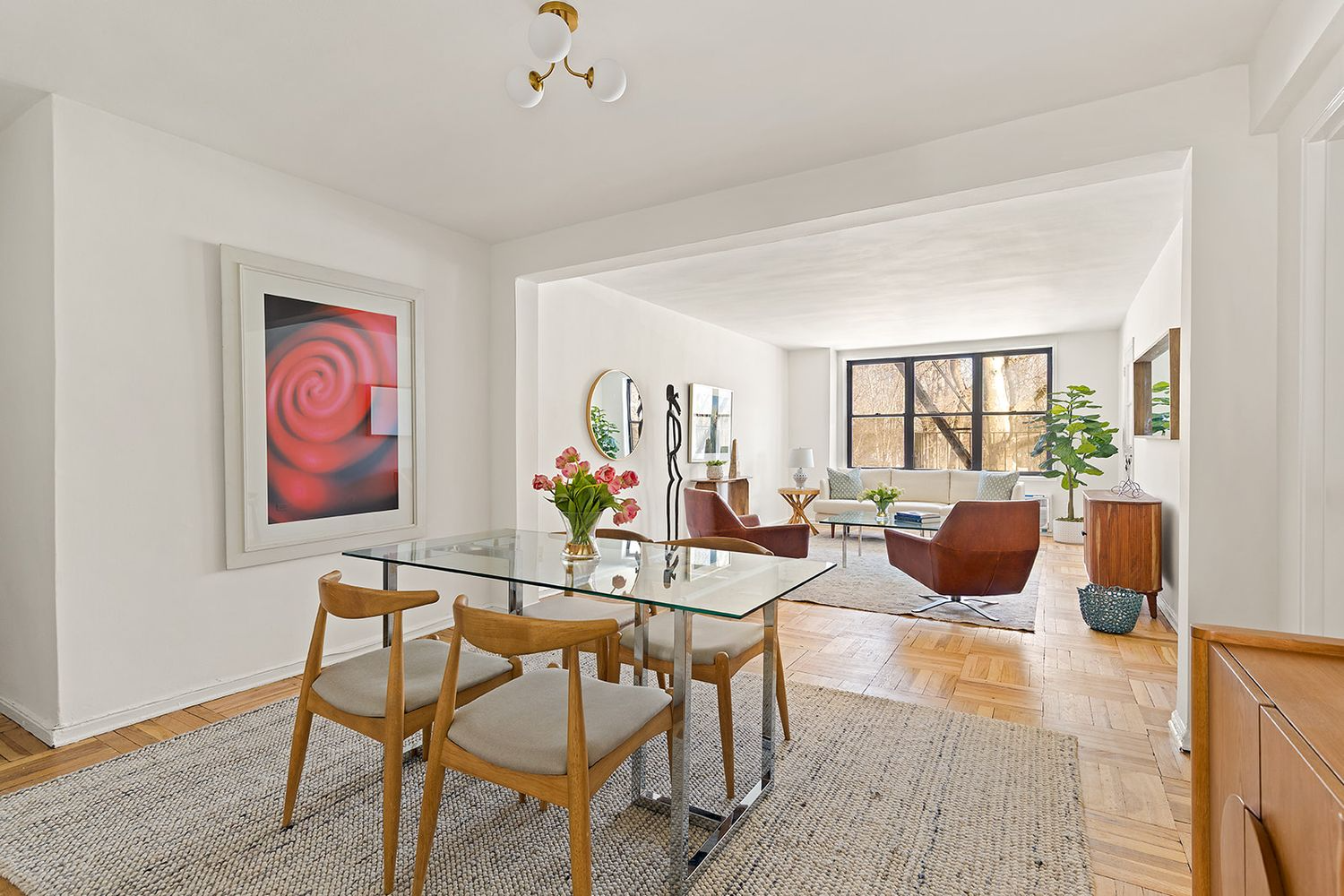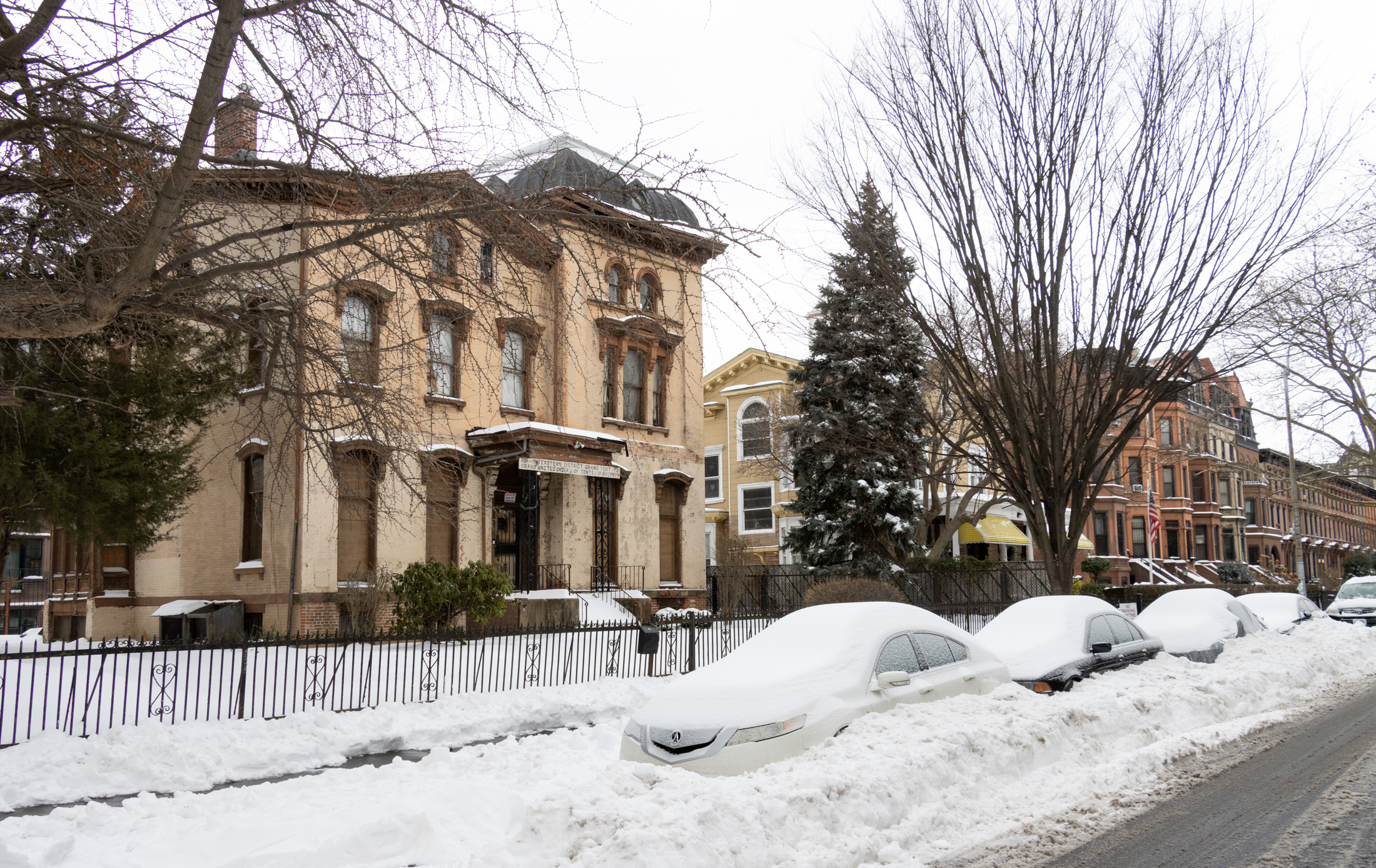School's Out in Williamsburg
Williamsburg and Greenpoint may be filling up with affluent families lured by the recent condo boom, but the well-heeled new residents are hardly beating a path to local schools. According to an article in this week’s Crain’s (sub. req’d), enrollment is plummeting in the neighborhoods’ public schools–it’s down 12 percent in elementary schools over the…


Williamsburg and Greenpoint may be filling up with affluent families lured by the recent condo boom, but the well-heeled new residents are hardly beating a path to local schools. According to an article in this week’s Crain’s (sub. req’d), enrollment is plummeting in the neighborhoods’ public schools–it’s down 12 percent in elementary schools over the past two years, with middle schools operating at 56 percent capacity, on average. The classrooms are emptying as older residents priced out of the neighborhoods are forced to leave and newer residents put off by what they consider to be conservative education practices decide to send their kids to schools farther afield. The trend is exposing chinks in the armor of the Bloomberg administration’s rezoning of northern Brooklyn, which was supposed to create a community where rich and poor (and their offspring) rubbed shoulders. On top of that, it could spell trouble ahead for developers who are marketing Williamsburg and Greenpoint buildings to young professionals with families. And developers are keenly aware of the areas’ lack of pull on the education front. “We have thought about it,” said Ron Moelis, a principal with L&M Equities, which is developing Schaefer Landing. “I don’t have an answer for you. There’s talk of a charter school, a new magnet school or maybe even a new private school. It would be great if that occurs.”
Photo by specmotors.





From my perspective, sending your kid to a school outside of the neighborhood does distance your family from their geographic community. I sent my daughter to school in lower Manhattan for 2 years, during which time we lost touch with our friends and neighbors, and we are still working to pick up that continuity. It also drew momentum away from local organizing efforts I had been involved with here in Williamsburg. I believe schools are a powerful force for community-building, a valuable social role aside from their fundamental role of academic instruction. This is one of the main motivations of the school organizing work, though with such vast diversity it is tough for everyone to feel recognized and understood, to find a sense of familiarity. Within the school, kids view each other as individuals not as representations of demographics, and they bond with each other based on their personalities and their interests. That’s where I see a lot of hope.
The situation at PS 84 was a mess, but that particularly hostile dynamic is not present in the other schools in the District. There were a series of failures by the school administration, the DoE, and community leadership which allowed these parents’ involvement with PS 84 to become a symbol of the displacement suffered by the school community, and for those families to reap the hostility that gentrification inspired. I am sure that more of the newer residents will feel comfortable sending their kids to local schools in the coming years, but for their involvement to be successful they will need the support of the community and a structured approach towards their integration and participation. The Town Hall meeting (see http://parents11211.com/article.php?story=20070624112635578) was organized with this goal, as a forum in which elected officials and other community stakeholders could demonstrate appropriate authority over this matter and assume a partnership with the DoE to address these complex issues. Some of the frustration with the wave of parents sending their kids out of District comes from the absence of their voices in this discussion. I hope that District 14 parents considering their school choices will continue to engage with each other and with community leadership to develop a process for District 14 to successfully serve all its diverse families. We have a great deal of support from our elected officials and community based organizations, several proposals to improve the District, and many engaged families who are investing in the potential of their involvement. This is a time of tremendous change for our neighborhood and I feel this issue goes to the core of our survival as a multidimensional community in this complex city. As a citizen of this wounded neighborhood I refuse to leave it to the forces of gentrification to sort out.
Since my child spent last year at 84 I can tell you all that there were some severe problems there. I don’t have the time to go into detail but It pretty much came down to a minority of mostly white, relatively new residents enrolling their kids in a predominantly hispanic school. There were the expected tensions of course, but the real problem is that they were exacerbated by the Principal and faculty. I think any problems could have been resolved between the parents if it wasn’t for some in the administration not taking an active role in tamping it down. Since the principal was at the time just temporary, who was seeking permanent status there, it appears she didn’t want to make any waves, and certainly not alienate the predominant hispanic population.
What resulted was some crazy paranoia that the “newcomers” were attempting to “steal†the school away. There was a huge hispanic push-back that led to the PTA president (who was there because literally no one else wanted the job) resigning. Let me tell all of you that there was a real sincere effort on the part of the new parents to improve that school. It was met with constant resistance at every turn. It doesn’t take a brain surgeon to realize no one is going to keep their child in a poorly performing school that has no seeming desire to change.
As far as 17 goes it’s the furthest behind of all the schools, in terms of instituting chage, in Williamsburg. Ironically PS17 is the school that would have the heaviest new enrollment since it serves the north section which has seen the largest influx of new parents. Still at least the kids have a playground.
FYI, here are the most recent test results from the Williamsburg elementaries:
PS 84
Reading 32.23Â
Mathematics 59.5
PS 132
Reading 64.33
Mathematics 80.3
ps 17
Reading 58.2
Mathematics 82.1
I think what you’re seeing in Williamsburg is probably nothing out of the ordinary for a New york neighborhood that has seen rapid gentrification and demographic shift. Stresses like this are bound to happen. However, on top of the demo shift there was a simultaneous baby boom from the newer wealthier residents, and a population decline in the poorer hispanic community, all of which fueled this incendiary situation. (as in much of NYC these days it’s become impossible for lower and middle class families to live in Williamsburg/Greenpoint). Should these developers actually sell these thousands of million $ condos they are assuring these pressures will only increase.
A couple of notes;
1. Don’t anybody fall for this Park Slope crap. I use to live there and one reason I moved here is because it is or at least was) a true neighborhood where everyone knew each other and were willing to help each other. And if PS is so hot on the education ticket how come they don’t send their kids to the high school smack dab in the middle of 7th Ave.?
2. I was one of the parents that “cheated†to get my kid into 84 ( It does have a very good pre-k). While I was a little conflicted about it, it helped rest my conscious to know that this city, state, and feds don’t mind taking my tax money and then not providing me with a decent school. And the NY DOE essentially says here’s your crappy school, don’t try to change it we won’t let you, and you can’t move because rents have risen so astronomically you couldn’t squeeze even 2 people let alone a family into a new home. My wife and I would have moved but, guess what, we couldn’t afford it. I think that idiot should shut up till she/he’s in the same situation.
3. I think what Kate should know is that the source of the “anger†is the very fact that we can’t send our kids to the local schools and insure they get a good or even decent educaction. We would love nothing better than to enjoy the fruits of sending our kids to the local schools where all their friends go and their families live. I imagine every parent wants to keep the child as close to home as possible.
Also we all applaud Kate’s enormous efforts on this issue. Thank you.
‘prioritizing a sense of connection to their neighborhood might prove to be a healthy and wholesome choice for the kids, and for the whole family. Stressing about making the best possible choice and having to manage commuting and distant playdates on top of afterschool activities and homework might just be counterproductive.’ – I find this to be a little condescending. This is speculation on your part since you have never experienced sending your kid to school outside the neighborhood. I guess if you don’t work in the city and you go right home after dropping your kid off it might be inconvenient for someone. But if the school is just a pitstop on the way to work, its really no big deal.
Staying local would definitely be anyones number one choice in lifestyle – most definitely. But when you aren’t satisfied with Plan A you have to move to Plan B. (and its okay if you are satisfied with plan A – no judgements) It does seem daunting to have to take your kids a little further to school in the morning but once the whole family gets into the routine, it just becomes part of the daily routine. Its really not a big deal. If it were a big deal, so many people wouldn’t be doing it. Different strokes for different folks.
“Being involved and connected to our geographic community” can be accomplished in many different ways outside of sending your kid to a local school. There are people who don’t have kids in our community. Are they less invested because they don’t have a family member to send to school? Just becasuse someone opts to send their kid to a school outside of the district, doesn’t mean they can’t or aren’t engaging themselves in and “prioritizing a sense of connection to their neighborhood.” While I respect what you are saying there is an undertone that reads that people who opt to send their kids to schools outside the community are not as invested in the community as those who do. The two aren’t mutually exclusive. Please correct me if I am wrong. No hostility intended.
It seems to me that among the demographic moving to W’burg, there is a lot of anxiety over consumer choices, especially those that lock you into a particular social community like choosing a school. Way beyond other choices like which stroller, breast or bottle, even nanny, day care or stay-at-home. These choices affect how we sense who we are, and in a time when parenting is disassembling our old identities, we are trying to put ourselves back together in a way which doesn’t shout “loser!” Maybe the passion in these posts has to do with wanting an edge for ourselves, having lost it to the continual demands and sleep deprivation or parenthood. There are plenty of successful young adults who received classic public education, and plenty of burned out young adults who were given every educational opportunity only to be unable to assimilate them into a useful foundation for a successful life. I think the answer to “what’s best for our children” can’t really be known before they are engaging with a school and you can see the dynamics in action. As long as it doesn’t have toxic mold or violence or a completely corrupt administration, your kids might thrive in surprising and healthy ways. Taking the pressure down a notch and prioritizing a sense of connection to their neighborhood might prove to be a healthy and wholesome choice for the kids, and for the whole family. Stressing about making the best possible choice and having to manage commuting and distant playdates on top of afterschool activities and homework might just be counterproductive. I do understand why families choose not to send their kids to local schools, though I didn’t realize that some of them thought so poorly of the “locals”, that’s pretty sad. I think it comes down to personal style, some find value in being involved and connected to our geographic community, in seeing what our engagement can encourage, while others prioritize being very discerning in our choices and see this kind of effort as frustrating, uncomfortable and ultimately compromised beyond any value. Building community across such vast diversity as exists here in Williamsburg is a huge challenge, and certainly is not everyone’s priority. But the hostility and defensive tone in so many of these posts is astonishing, to me it shows that many people are not entirely comfortable with how their choices reflect their values, with how they imagine those values to be perceived. So interesting that these school choices have become such fuel for judgement. I am at once entertained, horrified, and inspired that this seems to be such a powerful issue for this place in this time.
For those of you interested or curious about issues in school District 14, there are many avenues for involvement and participation within and outsde of the school system. You can contact me at kate@yourke.com and I can try to help you connect with an appropriate application for your interest. (No nasty comments to my inbox please!)
non-anonymously,
Kate Yourke
What’s the point in wringing one’s hands over all this. Mere academics aren’t enough to make a kid turn out to be a good person or to live a good life. It’s not enough to ensure independent financial success either. I’ve known so many brilliant people who went to the best schools in the world who are utter failures. The world is full of them.
There is nothing narcissistic about wanting to do the best you can for your child. Should it be “my child last”? Is that how you think?
Its a shame that there is such disparity amongst the schools withing NYC that people have to lie in order to get their kids a good education. I am sure the family that lies about their address would move to the district that houses PS 321 if they could afford to.
12:49, Erik said schools were funded in NYC to quote him, “not just property taxes”. Meaning property taxes certainly do fund the local schools, at least in part. Meaning the low low low property taxes everyone enjoys in Brooklyn provide less money to the schools, but allow families to afford to purchase properties far more costly than they could normally were they paying property taxes as high as the suburbs. The suburbs which have better schools. Which I found ironic. That’s all.